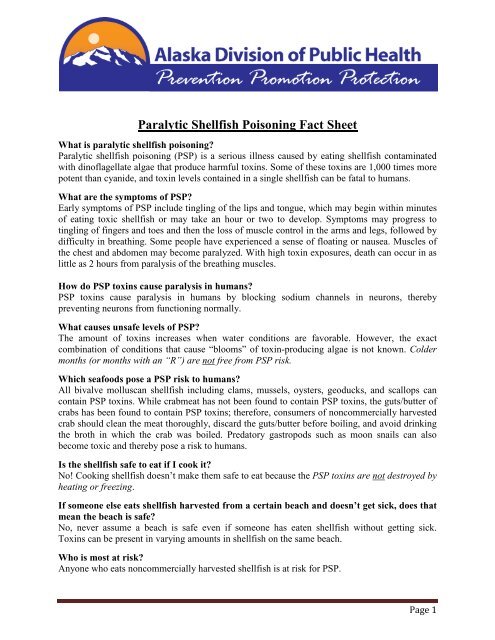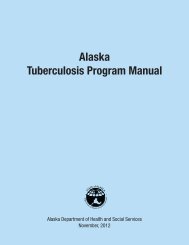Paralytic Shellfish Poisoning Fact Sheet - Epidemiology - State of ...
Paralytic Shellfish Poisoning Fact Sheet - Epidemiology - State of ...
Paralytic Shellfish Poisoning Fact Sheet - Epidemiology - State of ...
Create successful ePaper yourself
Turn your PDF publications into a flip-book with our unique Google optimized e-Paper software.
<strong>Paralytic</strong> <strong>Shellfish</strong> <strong>Poisoning</strong> <strong>Fact</strong> <strong>Sheet</strong><br />
What is paralytic shellfish poisoning?<br />
<strong>Paralytic</strong> shellfish poisoning (PSP) is a serious illness caused by eating shellfish contaminated<br />
with din<strong>of</strong>lagellate algae that produce harmful toxins. Some <strong>of</strong> these toxins are 1,000 times more<br />
potent than cyanide, and toxin levels contained in a single shellfish can be fatal to humans.<br />
What are the symptoms <strong>of</strong> PSP?<br />
Early symptoms <strong>of</strong> PSP include tingling <strong>of</strong> the lips and tongue, which may begin within minutes<br />
<strong>of</strong> eating toxic shellfish or may take an hour or two to develop. Symptoms may progress to<br />
tingling <strong>of</strong> fingers and toes and then the loss <strong>of</strong> muscle control in the arms and legs, followed by<br />
difficulty in breathing. Some people have experienced a sense <strong>of</strong> floating or nausea. Muscles <strong>of</strong><br />
the chest and abdomen may become paralyzed. With high toxin exposures, death can occur in as<br />
little as 2 hours from paralysis <strong>of</strong> the breathing muscles.<br />
How do PSP toxins cause paralysis in humans?<br />
PSP toxins cause paralysis in humans by blocking sodium channels in neurons, thereby<br />
preventing neurons from functioning normally.<br />
What causes unsafe levels <strong>of</strong> PSP?<br />
The amount <strong>of</strong> toxins increases when water conditions are favorable. However, the exact<br />
combination <strong>of</strong> conditions that cause “blooms” <strong>of</strong> toxin-producing algae is not known. Colder<br />
months (or months with an “R”) are not free from PSP risk.<br />
Which seafoods pose a PSP risk to humans?<br />
All bivalve molluscan shellfish including clams, mussels, oysters, geoducks, and scallops can<br />
contain PSP toxins. While crabmeat has not been found to contain PSP toxins, the guts/butter <strong>of</strong><br />
crabs has been found to contain PSP toxins; therefore, consumers <strong>of</strong> noncommercially harvested<br />
crab should clean the meat thoroughly, discard the guts/butter before boiling, and avoid drinking<br />
the broth in which the crab was boiled. Predatory gastropods such as moon snails can also<br />
become toxic and thereby pose a risk to humans.<br />
Is the shellfish safe to eat if I cook it?<br />
No! Cooking shellfish doesn’t make them safe to eat because the PSP toxins are not destroyed by<br />
heating or freezing.<br />
If someone else eats shellfish harvested from a certain beach and doesn’t get sick, does that<br />
mean the beach is safe?<br />
No, never assume a beach is safe even if someone has eaten shellfish without getting sick.<br />
Toxins can be present in varying amounts in shellfish on the same beach.<br />
Who is most at risk?<br />
Anyone who eats noncommercially harvested shellfish is at risk for PSP.<br />
Page 1
If the water looks dirty or red, does that mean that shellfish will contain PSP toxins?<br />
No, paralytic shellfish toxins are rarely associated with a red tinge to the water; reddish<br />
coloration <strong>of</strong> the water is more commonly caused by non-toxic organisms.<br />
If the water is not red, does that mean that shellfish are not contaminated?<br />
No, PSP can be present in large amounts even if the water looks clear. Also, the toxin can remain<br />
in shellfish long after the algae bloom is over.<br />
Can I tell if it’s safe to gather shellfish by how they look?<br />
No, only laboratories can reliably test shellfish for PSP. Toxins can be present with no visible<br />
signs.<br />
Can I safely harvest in colder months?<br />
No, there have been cases <strong>of</strong> PSP in Alaska year-round. There may be some seasonality<br />
associated with the level <strong>of</strong> PSP risk, but it is never completely safe to consume<br />
noncommercially harvested shellfish.<br />
How can I protect my family and myself from paralytic shellfish poisoning?<br />
The only way to protect your family and yourself from PSP is by not eating noncommercial<br />
shellfish collected from beaches in Alaska. Commercial shellfish in Alaska are routinely tested<br />
and are considered safe to eat.<br />
What should I do if I think that I have paralytic shellfish poisoning?<br />
Seek medical care immediately. Call 911 or have someone take you to the emergency room.<br />
What is the treatment?<br />
Unfortunately, there is no antidote for PSP toxins; however, supportive medical care can be life<br />
saving. For example, persons whose breathing muscles become paralyzed can be put on a<br />
mechanical respirator and given oxygen to help them breath, and people who develop a cardiac<br />
arrhythmia (abnormal heart rhythm) can be given medications to stabilize their heart rhythm.<br />
Are there any other illnesses associated with shellfish?<br />
Yes, a person may have an allergic reaction to shellfish or become ill due to bacteria or viruses in<br />
shellfish.<br />
What else can be done to prevent these diseases?<br />
It is important to notify public health departments about even one person with PSP or any other<br />
illness caused by consumption <strong>of</strong> shellfish. Public health departments can then investigate to<br />
determine the source <strong>of</strong> the problem to help prevent additional illness. Any suspected cases <strong>of</strong><br />
PSP should be reported to the <strong>State</strong> <strong>of</strong> Alaska Section <strong>of</strong> <strong>Epidemiology</strong> at 907-269-8000 or after<br />
hours at 1-800-478-0084.<br />
What if I choose to eat noncommercially harvested shellfish despite these risks?<br />
The Alaska Division <strong>of</strong> Public Health strongly recommends against eating noncommercial<br />
shellfish from Alaska waters. However, if people choose to do so, they should never eat alone,<br />
know what the symptoms <strong>of</strong> PSP are, and seek medical care immediately if symptoms develop.<br />
Section <strong>of</strong> <strong>Epidemiology</strong> <strong>Paralytic</strong> <strong>Shellfish</strong> <strong>Poisoning</strong> <strong>Fact</strong> <strong>Sheet</strong> Page 2<br />
3601 C Street, Suite 540 Last Updated January 2012<br />
Anchorage, AK 99503<br />
907-269-8000<br />
(f) 907-562-7802



